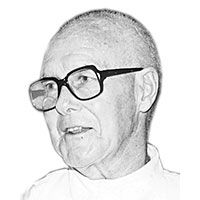Babies — bought — sold and traded

October 22, 2005 | 12:00am
An organization called Zenit, based in London, has called attention to new forms of human trafficking. When we speak of "selling people," we usually think of someone selling a woman, or a teen age girl, or a young child. But the swift advance of genetic science has created new ways of selling people.
Unborn children are being treated as consumer products. The National Academy of Sciences of Ukraine, in Kharkov, sells baby parts. The list on its web site offers a variety of cells and other tissues from babies.
The Institute for Problems of Cryobiology and Cryomedicine, in Ukraine, insists that the material comes from fetuses aborted at an early stage of life. But the London Times reports that this claim is under serious doubt. Newly born babies have been disappearing from maternity wards in the city of Kharkov.
Ukrainian law considers that babies born before 27 weeks, or weighing less than one kilogram, 2.2 pounds, are automatically considered abortions. As such, the babies are not officially registered, and are sometimes taken away from their mothers and not returned. This was reported by the very conservative London Times.
Another British newspaper, the Observer, reported that Ukrainian women were being paid to sell their fetuses to clinics. The tissues are then used for beauty treatments that are supposed to rejuvenate the skin and cure diseases. The Observer claimed that the women were paid 100 pounds – which is $182 US dollars at current exchange rates – for each fetus. These fetuses, unborn children, were later sold in Russia for up to 5,000 pounds – $9,100 US dollars.
In Canada, concern was expressed over the use of "fresh" embryos as a source of stem cells. Doctor Jeffrey Nisker of the University of Western Ontario, and Doctor Francoise Baylis of Dalhousie University in Halifax, in the Journal of the Canadian Medical Association, warned that women are being encouraged to donate fresh, as opposed to "surplus" frozen embryos – left over from previous in-vitro fertilization treatments – in order to create stem cells.
The doctors warned that the women who donated these embryos were decreasing their chances of getting pregnant in the future.
Doctor Baylis complained about the "surreptitious" way in which the Canadian Institute of Health Research, a federal agency, quietly changed the rules, to explicitly allow stem cell researchers to use fresh embryos. Only two days later, a Toronto research team, headed by Doctor Andras Nagy, announced that they were not only working with fresh embryos but had already used them to create Canada’s first human embryonic stem cells.
Doctor Jeffrey Nisker was shocked at the change in Canadian law. He said: "I never imagined that a woman would be approached to give up a fresh embryo. The doctors who ask women to do this are breaking their medical code of ethics."
This is selling unborn babies to help future human beings. It violates an age old axiom: "The end never justifies the means". You can not murder a child in the womb in order to help some unknown people in the future. But the problem is deeper than that!
A scientist who works with animals, Ian Wilnut, argues that human embryonic stem cells should be used, in order to save animals from being used in tests.
In a speech at Glasgow University Vet School, Wilnut said that studying incurable human diseases by creating human embryos and cloning them as cell lines would save "potentially many thousands of animals."
The intentions of Ian Wilnut, obviously, are good. He recently applied for a license to use embryonic stem cells to develop a cure for Lou Gehrig’s disease, a motor neuron disorder. But you can not sell an unborn child to save "potentially many thousands of animals."
Babies suffering from genetic defects are being eliminated, as if they were not fit to live. There was a survey of 3,000 parents of children with Down Syndrome. It was published in the American Journal of Obstetrics and Gynecology. The health professionals, after the pre-natal screening, talking to both parents, generally painted a very sad picture of the consequences of bearing a child with this problem.
The result: 80 percent of babies now being diagnosed with Down Syndrome, in prenatal tests, are aborted. At least in the United States. And doctors, who do not warn mothers about their fetuses’ defects, run the risk of being sued "for failure to counsel patients about hereditary disorders."
And yet, according to the national Down Syndrome Society, those who suffer from Down Syndrome, instead of being relegated to institutions, are now living peacefully at home, mixing freely and naturally with normal people. Better medical attention has seen a dramatic increase in their life expectancy. Babies who survive often live deep into their 50s.
And every mother knows that the child with the Down Syndrome is extremely affectionate, obedient, docile, friendly, a joy to everyone in the family. The whole family is always proud of their "special child".
An Irish couple, Joe and Lala Dowse, living in Indonesia, adopted a three year old child, Tristan. They adopted because they were childless. But, two years later, Lala conceived and bore her own baby. When they left Indonesia, they gave Tristan back to the orphanage, which had a "consumer friendly returns policy".
Brenda Power, who reported this in the London Times, was mildly upset. It sounded like: "Child for sale, or for rent." Of course, it did wound the sensitive heart of five-year old Tristan. But it was not an offense against justice. At least Joe and Lala gave Tristan two years in a real home, with a father and a mother. It just would have been kinder if they had kept the child as their own, their first born.
This kind of thing has happened very often in the Philippines. A wife, who is childless and seems to be barren, adopts a new born baby. It is such a comfort to her, to hold this baby in her arms! To take care of her. It answers some deep need in the heart of the adopting mother. And, lo! She conceives her own babies, one after the other.
But in the Philippines, they keep the adopted child, always. She becomes the Ate, loved by all her sisters and brothers. Loved by her adopting parents. They look on her as a beautiful gift from God.
Not all the news is bad. John Paul II canonized an Italian mother, a doctor, who had many children, but in her last pregnancy was diagnosed with a tumor in her womb. She refused any medical treatment that would endanger her baby. The child was safely born, and the mother died. At her canonization, her husband was there, and the girl for whom she gave her life, and all her children. Assisting John Paul at the altar was her eldest son, who had become a priest.
There are many, many good women like that. They do not look upon the baby in their womb as a consumer product. That can be killed, butchered, and sold piece by piece. They know that their baby is a beautiful gift from God.
There is a texting service to help stop human trafficking.
You can reach it on Smart by texting: "Rescue @ 326"
You can reach in on Globe by texting: "Rescue1 @ 2978"
Unborn children are being treated as consumer products. The National Academy of Sciences of Ukraine, in Kharkov, sells baby parts. The list on its web site offers a variety of cells and other tissues from babies.
The Institute for Problems of Cryobiology and Cryomedicine, in Ukraine, insists that the material comes from fetuses aborted at an early stage of life. But the London Times reports that this claim is under serious doubt. Newly born babies have been disappearing from maternity wards in the city of Kharkov.
Ukrainian law considers that babies born before 27 weeks, or weighing less than one kilogram, 2.2 pounds, are automatically considered abortions. As such, the babies are not officially registered, and are sometimes taken away from their mothers and not returned. This was reported by the very conservative London Times.
Another British newspaper, the Observer, reported that Ukrainian women were being paid to sell their fetuses to clinics. The tissues are then used for beauty treatments that are supposed to rejuvenate the skin and cure diseases. The Observer claimed that the women were paid 100 pounds – which is $182 US dollars at current exchange rates – for each fetus. These fetuses, unborn children, were later sold in Russia for up to 5,000 pounds – $9,100 US dollars.
In Canada, concern was expressed over the use of "fresh" embryos as a source of stem cells. Doctor Jeffrey Nisker of the University of Western Ontario, and Doctor Francoise Baylis of Dalhousie University in Halifax, in the Journal of the Canadian Medical Association, warned that women are being encouraged to donate fresh, as opposed to "surplus" frozen embryos – left over from previous in-vitro fertilization treatments – in order to create stem cells.
The doctors warned that the women who donated these embryos were decreasing their chances of getting pregnant in the future.
Doctor Baylis complained about the "surreptitious" way in which the Canadian Institute of Health Research, a federal agency, quietly changed the rules, to explicitly allow stem cell researchers to use fresh embryos. Only two days later, a Toronto research team, headed by Doctor Andras Nagy, announced that they were not only working with fresh embryos but had already used them to create Canada’s first human embryonic stem cells.
Doctor Jeffrey Nisker was shocked at the change in Canadian law. He said: "I never imagined that a woman would be approached to give up a fresh embryo. The doctors who ask women to do this are breaking their medical code of ethics."
This is selling unborn babies to help future human beings. It violates an age old axiom: "The end never justifies the means". You can not murder a child in the womb in order to help some unknown people in the future. But the problem is deeper than that!
A scientist who works with animals, Ian Wilnut, argues that human embryonic stem cells should be used, in order to save animals from being used in tests.
In a speech at Glasgow University Vet School, Wilnut said that studying incurable human diseases by creating human embryos and cloning them as cell lines would save "potentially many thousands of animals."
The intentions of Ian Wilnut, obviously, are good. He recently applied for a license to use embryonic stem cells to develop a cure for Lou Gehrig’s disease, a motor neuron disorder. But you can not sell an unborn child to save "potentially many thousands of animals."
Babies suffering from genetic defects are being eliminated, as if they were not fit to live. There was a survey of 3,000 parents of children with Down Syndrome. It was published in the American Journal of Obstetrics and Gynecology. The health professionals, after the pre-natal screening, talking to both parents, generally painted a very sad picture of the consequences of bearing a child with this problem.
The result: 80 percent of babies now being diagnosed with Down Syndrome, in prenatal tests, are aborted. At least in the United States. And doctors, who do not warn mothers about their fetuses’ defects, run the risk of being sued "for failure to counsel patients about hereditary disorders."
And yet, according to the national Down Syndrome Society, those who suffer from Down Syndrome, instead of being relegated to institutions, are now living peacefully at home, mixing freely and naturally with normal people. Better medical attention has seen a dramatic increase in their life expectancy. Babies who survive often live deep into their 50s.
And every mother knows that the child with the Down Syndrome is extremely affectionate, obedient, docile, friendly, a joy to everyone in the family. The whole family is always proud of their "special child".
An Irish couple, Joe and Lala Dowse, living in Indonesia, adopted a three year old child, Tristan. They adopted because they were childless. But, two years later, Lala conceived and bore her own baby. When they left Indonesia, they gave Tristan back to the orphanage, which had a "consumer friendly returns policy".
Brenda Power, who reported this in the London Times, was mildly upset. It sounded like: "Child for sale, or for rent." Of course, it did wound the sensitive heart of five-year old Tristan. But it was not an offense against justice. At least Joe and Lala gave Tristan two years in a real home, with a father and a mother. It just would have been kinder if they had kept the child as their own, their first born.
This kind of thing has happened very often in the Philippines. A wife, who is childless and seems to be barren, adopts a new born baby. It is such a comfort to her, to hold this baby in her arms! To take care of her. It answers some deep need in the heart of the adopting mother. And, lo! She conceives her own babies, one after the other.
But in the Philippines, they keep the adopted child, always. She becomes the Ate, loved by all her sisters and brothers. Loved by her adopting parents. They look on her as a beautiful gift from God.
Not all the news is bad. John Paul II canonized an Italian mother, a doctor, who had many children, but in her last pregnancy was diagnosed with a tumor in her womb. She refused any medical treatment that would endanger her baby. The child was safely born, and the mother died. At her canonization, her husband was there, and the girl for whom she gave her life, and all her children. Assisting John Paul at the altar was her eldest son, who had become a priest.
There are many, many good women like that. They do not look upon the baby in their womb as a consumer product. That can be killed, butchered, and sold piece by piece. They know that their baby is a beautiful gift from God.
You can reach it on Smart by texting: "Rescue @ 326"
You can reach in on Globe by texting: "Rescue1 @ 2978"
BrandSpace Articles
<
>
- Latest
- Trending
Trending
Latest
Latest
Recommended

June 2, 2024 - 12:00am





















